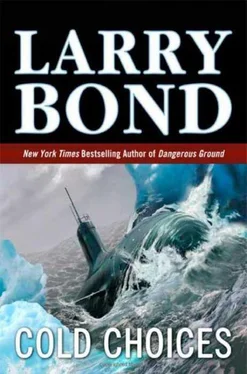The arrival of the Norwegians had given them new hope, sustained by the letters from their families and the supplies from Seawolf. With tangible support from three nations, they’d found the strength to endure, but Petrov knew how fragile that endurance was.
Besides, his men had waited for so long. He would enjoy making everyone else wait for them for a change.
Petr Velikiy
Borisov watched from his command chair as they ran down the checklist. He fought the urge to ask questions. The timing was calculated almost to the second, and he’d checked their calculations over and over. He even had a copy in front of him.
The real question was, what else should be on that list? Like a traveler leaving the house, the question nagged at him. What had they forgotten?
Halsfjord was positioning its remote vehicles now. The American remote, “Maxine,” was already in place, while Seawolf herself had withdrawn to three kilometers, close enough to maintain acoustic communication, but clear of the three small underwater vehicles or anything that might go over the side.
The three unmanned vehicles, two Norwegian and one American, were spaced equally around a circle three hundred meters in diameter. If the rescue went well, they’d be able to record the process. If there was a problem, there was a small chance they would be able to correct it.
He scanned the monitors that filled every spare corner of the flag command post. Most displayed status reports: helicopter fuel, weather, equipment breakdowns. One showed a video image of someone in an impossibly bright blue parka, standing on the fantail of one of the tugs. A crawl across the bottom in alternating Russian and English identified him as Britt Adams, a reporter for Skynews aboard the tug Pamir. Thankfully, the audio was off.
Patterson had convinced the admiral that the tug was the best place for a reporter to be. He was going to report anyway, she argued, and Borisov had conceded that point. And he certainly wouldn’t find any state secrets aboard a tugboat. The admiral had agreed with that as well. And what better way to show the Russian effort to save their crew than a live feed of Pamir straining at the cables?
Borisov had given his permission, and Adams had been helicoptered over to Pamir at dawn. A condition of his presence was that his video signal was relayed from Pamir to the flagship, and then to a satellite. Borisov could cut this transmission at any time — rather, the English-speaking captain-lieutenant who’d been ordered to watch Adams’s broadcast could.
The tugs and Halsfjord were all in position. In fact, they couldn’t move out of position, and that was beginning to make him impatient. The rest of the task force had assumed stations one mile away from Severodvinsk , and every ship had at least one boat out with a crew standing by. Legkiy’s boat was already in the water, standing by with a line she’d attach to the escape chamber.
Every ship with a helicopter had it fueled and ready. Every sickbay, including Petr Velikiy ’s extensive medical facilities, was on alert. Everything that could be thought of had been done.
Borisov would not give the order. As far as that went, he’d already given the order, back when he took over the rescue. Lindstrom had control of the detonators and a Russian liaison on Halsfjord would tell the two tugs when to start pulling. And Lindstrom would give the signal only when Petrov said he was ready.
Severodvinsk
“It’s time,” Petrov announced softly. Kalinin stood slowly, favoring his sprain, ready to direct the evacuation, but everything had been thoroughly planned. Even if they hadn’t held evacuation drills before the collision, they’d dreamed of little else since. Petrov had even calculated and recalculated how long it would take them to reach the surface. From their current depth, he figured one minute and forty-nine seconds. That was all it would take.
Now, with few words, and not as quickly as he would have liked, men pulled themselves up, taking care to stay wrapped against the cold.
Senior-Lieutenant Shubin did show some energy as he opened the access hatch, hopefully for the last time, Petrov thought, and then climbed up into the chamber. A moment later, he poked his head out and looked towards Kalinin. After reporting that everything was in order, a weary smile appeared on his tired face. “Why am I looking forward to going somewhere even colder than this place?”
Senior-Lieutenant Kozyrev, waiting for his turn to climb, answered, “I’d take up with a polar bear and live on the ice to get away from your breath.” Several crewmen laughed. Nobody had been able to brush their teeth for several days, and there were worse odors.
“Yours is no better,” Shubin countered. “You can use yours to stun a bear. I now know why it is so hard for you to find dates.” That made everyone laugh, and the pace increased a little.
Once a dozen able-bodied men had climbed into the escape chamber, it was time to send up the wounded. The sixteen injured crewmen all had injuries that prevented them from climbing the ladder into the chamber: sprains, broken bones, wrenched backs. Kalinin was the first to go up. He would supervise the men in the chamber, and he wanted the men to practice with him.
It was a slow process. In drills they’d held before the collision, they’d gotten eighty-five men into the escape chamber in seventeen minutes, beating the navy requirement by three minutes. Now, even with fewer men to load, Petrov guessed it would take an hour.
One by one, the injured were gently lifted and carried to the base of the ladder. Some could stand, but many had to be held upright while a line was passed under their shoulders. Then the men above gently, carefully, brought their disabled shipmate up into the chamber and belted them in place. The exertion made the men on the ropes cough, and it took five or six to do what would normally be the work of two men.
The escape chamber was a cylinder two decks high. Each deck was a circular space with seats lining the bulkhead. The upper deck was open in the middle, and little more than a wide ring, allowing the men to move to and from their seats. It was not the best of accommodations. The injured were all strapped in on the lower deck, with healthy men on either side. Sadilenko was a special case. Dr. Balanov had insisted on keeping him completely sedated, and in a straitjacket as well. He was sent up last, after the injured men, limp as wet paper. A rope harness added to the seat held him upright.
Maybe it was the thought of escape, or the increased activity. Certainly the coughing and moans of the wounded hadn’t helped, but Petrov felt a wave of claustrophobia wash through him. Suddenly he couldn’t draw a full breath. The cold air filled his lungs and refused to sustain him.
The last of the men were climbing now. Lyachin, the senior officer after the starpom, reported to Petrov, “Codes and classified material have been passed up, sir.” He held up the logbook. “I was going to take this up myself. We are the last two.”
The engineer’s report pulled Petrov out of his funk, and he instinctively looked around the command post, as if to make sure nothing had been left behind. Lyachin saw him look, and said, “We’ve had two people count, and they matched. Sixty-five men are in the chamber, comrade Captain. You and I will make it sixty-seven.”
Petrov nodded and walked over to the underwater communications station. “Halsfjord, this is Severodvinsk. Everyone is in the rescue chamber.” He looked at his watch for a moment, then said, “We will flood the starboard ballast tanks in one minute. mark!”
Читать дальше












